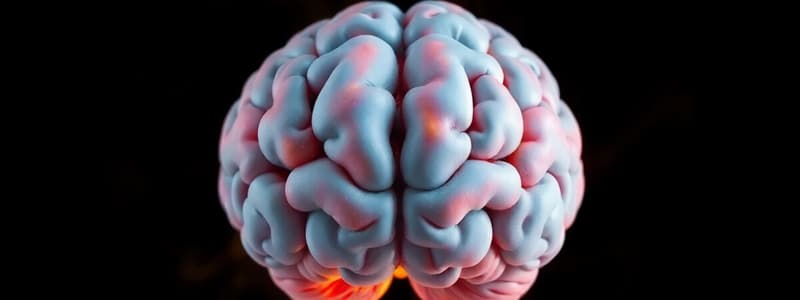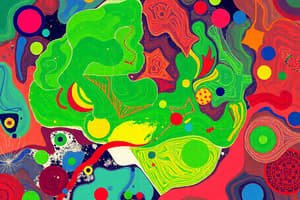Podcast
Questions and Answers
What is true regarding brain development in relation to age?
What is true regarding brain development in relation to age?
- Brain development is faster at a young age. (correct)
- Brain development significantly declines after adolescence.
- Brain development is slower at a young age.
- Brain development is uniform across all ages.
How does PTSD affect the grieving process?
How does PTSD affect the grieving process?
- PTSD has no effect on the grieving process.
- PTSD allows for a quicker resolution of grief.
- PTSD completely interrupts the grieving process. (correct)
- PTSD enhances the grieving process.
Which factor is most beneficial in coping with PTSD?
Which factor is most beneficial in coping with PTSD?
- Engaging in self-blame.
- Avoiding discussions about trauma.
- A good support system. (correct)
- Isolation to avoid triggers.
What is a common misconception about the timing of brain development?
What is a common misconception about the timing of brain development?
What is a common misunderstanding regarding PTSD and grief?
What is a common misunderstanding regarding PTSD and grief?
At what stage does brain development occur more rapidly?
At what stage does brain development occur more rapidly?
What effect does PTSD have on the grieving process?
What effect does PTSD have on the grieving process?
What is a key factor in managing the effects of PTSD?
What is a key factor in managing the effects of PTSD?
Which age group generally experiences faster brain development?
Which age group generally experiences faster brain development?
Which statement about PTSD is true?
Which statement about PTSD is true?
Flashcards are hidden until you start studying
Study Notes
Brain Development and Age
- Brain development is a continuous process that starts before birth and continues into adulthood.
- The most rapid brain development occurs during childhood and adolescence.
PTSD and Grief
- PTSD can interfere with the natural grieving process by hindering emotional processing.
- People with PTSD often experience difficulty accepting loss and may struggle with feelings of guilt, shame, and self-blame.
Misunderstandings about Brain Development and PTSD
- A common misconception is that brain development is complete by adulthood.
- This is an incorrect understanding, as brain development continues throughout life.
- Another misconception is that PTSD and grief are the same.
- Grief is a natural response to loss, while PTSD is a disorder that stems from traumatic events.
Coping with PTSD
- A key factor in managing the effects of PTSD is seeking support from mental health professionals. This can involve therapy, medication, or both.
- Understanding and acknowledging the impact of PTSD on the individual's experience is crucial for coping.
General Statements about PTSD
- PTSD, while challenging, is a treatable condition.
- It is important to recognize that PTSD is not a sign of weakness, and individuals experiencing it should reach out for help.
Brain Development and Age
- Brain development continues throughout life with rapid changes occurring during childhood and adolescence
- The prefrontal cortex, responsible for executive functions like planning and impulse control, develops until the mid-20s
PTSD and Grief
- PTSD can significantly impact the grieving process, often leading to delayed or prolonged grief
- People with PTSD may experience intense emotional reactions, difficulty processing loss, and avoidance behaviors that hinder healthy grieving
- A common misconception is that PTSD and grief are the same, however, PTSD is a distinct disorder with symptoms that can interfere with managing grief
Coping with PTSD
- Social support is crucial for effectively managing PTSD
- Strong social connections help individuals build resilience, process traumatic experiences, and access necessary resources
Misconceptions About Brain development
- A common misunderstanding is that brain development is complete by adulthood, however, the brain continues to change and adapt throughout life
Studying That Suits You
Use AI to generate personalized quizzes and flashcards to suit your learning preferences.




